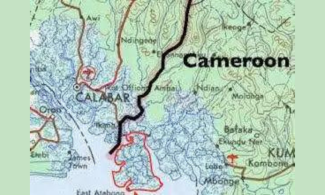
The governor made the declaration on Monday at a public hearing organised by an ad hoc committee of the House of Representatives.
Governor Bassey Otu of Cross River State has stated that his administration will no longer allow any part of its lands to be ceded to Cameroon in the name of implementing the 2002 judgment of the International Court of Justice.
The governor made the declaration on Monday at a public hearing organised by an ad hoc committee of the House of Representatives.
The committee was set up to investigate a land tussle between the Danare community in the Boki Local Government Area of Cross River and the Biajua community, split between Cross River and Cameroon.
The development follows a 2002 judgment by the International Court of Justice (ICJ) at The Hague, Nigeria began ceding parts of the Bakassi Peninsula in Cross River to Cameroon in 2006.
The territory was ceded entirely to Cameroon on August 14, 2008, exactly two years after the first part of it was transferred.
However, Emmanuel Ironbar, Chief of Staff to Mr Otu, who represented the governor at the public hearing, said the state was still nursing the consequences of the loss of Bakassi and its 76 oil wells to Cameroon.
According to the statement, Cross River believed that the issue could be revisited, while urging the committee to invite relevant stakeholders involved in the loss of the oil-rich peninsula to get to the root of the matter.
He said; “Let it be known that Cross River will no longer allow any part of its lands to be ceded to Cameroon in the name of implementing the 2002 judgment of the ICJ.
“The visitation of the committee members to the disputed pillars 113 and 114 in Boki communities is a welcome development and will help you to put up painstaking reports,” the governor said.
The committee chairman, Beni Lar, while addressing stakeholders at the public hearing, said the house passed a resolution on July 5 to investigate the circumstances leading to the boundary dispute between Nigeria and Cameroon.
Beni Lar explained that the essence was to unravel the circumstances leading to the non-traceability and displacement of a crucial international pillar, 113A, in the demarcation of the boundary between Nigeria and Cameroon.
Meanwhile, in their submissions, leaders of Danare and Biajua communities led by a former legislator, Cletus Obung, said the federal government’s attitude was not encouraging.
“In spite of pleas to the Nigerian government to make strong statements and ensure that the contentious Pillar 113A is found and restored, its attitude has not been encouraging.
“The Nigerian government has not made a strong statement to intervene in the situation and prevent our communities from being ceded to the republic of Cameroon; this is disappointing,” he noted.